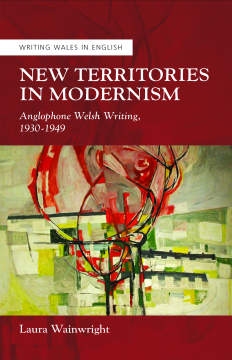
Additional Information
Book Details
Abstract
Until very recently, Welsh literary Modernism has been critically neglected, both within and outside Wales. This is the first book devoted solely to the study of Welsh literary Modernism, revealing and examining eight key Anglophone Welsh writers. Laura Wainwright demonstrates how their linguistic experimentation constituted an engagement with the unprecedented linguistic, social and cultural changes that were the making of modern Wales, and formed the crucible for the emergence of a distinct Welsh Modernism. This study of Welsh Modernism challenges conventional literary histories and, in more than one sense, takes Modernism and Modernist studies into new territories.
Table of Contents
| Section Title | Page | Action | Price |
|---|---|---|---|
| Cover | i | ||
| Title Page | iv | ||
| Copyright | v | ||
| Dedication | vi | ||
| Contents | viii | ||
| Series Editors’ Preface | x | ||
| Acknowledgements | xii | ||
| Introduction | 1 | ||
| 1: 'The dissolving and splitting of solid things': Welsh Modernism's 'crisis of language' | 5 | ||
| 2: 'Always observant and slightly obscure': Lynette Roberts as Welsh Modernist | 49 | ||
| 3: Vernon Watkins's 'Modern Country of the Arts' | 75 | ||
| 4: Cadaqués and Carmarthenshire: The Modernist 'Heterotopias' of Salvador Dalí and Dylan Thomas | 105 | ||
| 5: 'Hellish Funny': The Grotesque Modernism of Gwyn Thomas and Rhys Davies | 127 | ||
| Conclusion | 157 | ||
| Notes | 159 | ||
| Bibliography | 189 | ||
| Index | 211 | ||
| Back Cover | 224 |
